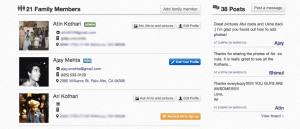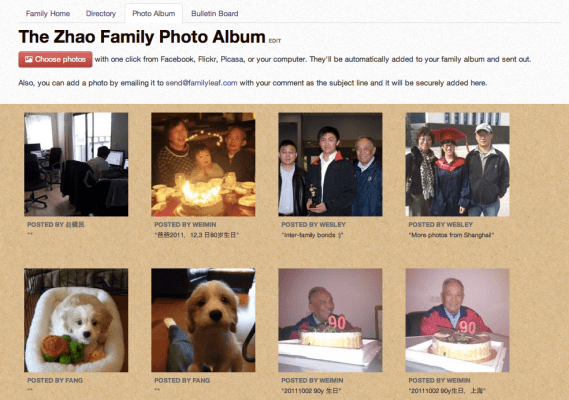Facebook is on its way to having a billion members, but it’s not always making friends everywhere it goes. Two young men, both aged 19 and in the most recent crop of Y Combinator startups, think they’ve found a gap in the market that has yet to be served that well by the biggest social network: families.
FamilyLeaf was created by childhood friends Wesley Zhao and Ajay Mehta (last seen here spinning out a Y U NO yarn to gain entry into YC; it worked). And it was borne out of a desire to have an easy-to-use online space for you and your relations that address some key “misuse” of sites like Facebook — something they say became especially apparent to the two of them after they left for college (respectively Wharton and NYU Stern, where they are now on a leave of absence).
In their view, Facebook doesn’t make it that easy for families to have a private network, and it’s not very straightforward to create silos to share things with some people (like your friends) but not others (like your family). On top of that, there are many who refuse to join Facebook because of wider Facebook/privacy concerns (and I’m not arguing either side of that here, just stating a fact).
Yes, there are plenty of other sites that have tried to address the family social networking angle, but what’s attractive about FamilyLeaf is that for now, it’s free to use and very easy to get started.
Once you activate a FamilyLeaf network, you can use it as a kind of private, centralized digital locker: you can share contact information, photos, and post messages to your family. And while you can do all that through the site’s homepage, you can also, more simply, update the page by sending to an email address (the site links it up automatically based on the email address). Mehta tells me that email uploading was key to developing the site because they found that this is how many families share photos and other information already these days.
Photos currently can come from Facebook, Instagram, Flickr, Picasa, or from a user’s hard drive by way of Chute. A family administrator controls each group, and users can be a part of more than one family. Mehta for example has three: his mom’s, dad’s and stepdad’s families each have separate networks on FamilyLeaf spanning the U.S., Europe and India.
India.
In addition to Zhao and Mehta’s own families, other Y Combinator founders have signed on, too. They’ve found, so far, that the site has been particularly resonant with those who have a lot of long-distance connections, probably because it’s that much harder to keep up with people when they’re in different timezones.
On a more personal level, that really resonated with me. It’s not often that I come across new services that seem to speak to my life at the moment, but this company seems to have done that with this long-distance family pitch. (I was born in Moscow, Russia; grew up across four cities in the U.S.; and now live in London and have started my own family here. My parents are still in the U.S., though; and my extended family still in Russia. My in-laws are in a different place altogether: France. Very far-flung.) I had to take a closer look.
So I’m giving the site a whirl myself. So far, in the handful of family members that I’ve invited since yesterday, I’ve had a couple of responses, very positive ones. Pictures and the rest will need to come on a day when I’m not quite so busy with work.
But that’s before I’ve even started trying to think of how to invite people like my two crazy aunts in Moscow, Kira and Natasha. What about them?
The founders say that they have designs on how to address that — that is, bring in even those who are nowhere near the Internet grid. “We want to bring in older generations,” says Zhao. He declined to go into details of how that would work but says it would involve “merging the worlds of snail mail and email.”
Apart from the ambitious idea of trying to bridge familial digital divides — which would really be cool if achievable — I can see other potential in this service. For example, incorporating video and voice calling, or even livestreams of family events for those who can’t attend them. There is also the possibility of bringing in APIs to offer other kinds of services, such as plane and hotel bookings. In other words, if privacy and how your information is shared is one of the issues with Facebook they are trying to address, you can see the potential for business models that don’t center around advertising, but around value-added services.
They are also on the way to making the site more internationally-friendly. There are already versions in Chinese, Hindi, Greek, Russian, French, Spanish and Italian, in addition to English.
